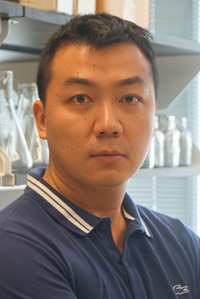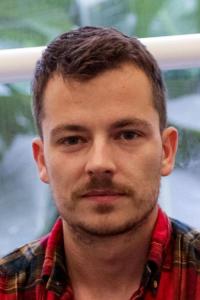The Schaefer Research Scholar Awards 2023!
VP&S Scientists Dr. Chao Lu and Dr. Mijo Simunovic Receive Schaefer Research Scholar Awards
Chao Lu, PhD
Project: "Reversal of the epigenetic clock for anti-aging therapy"
Biological age and chronological age are not always equal, with some individuals showing the effects of age years earlier than others with the same birthdays.
In the past decade, the epigenetic clock (a measurement of age-related DNA methylation changes) has become a popular marker of biological aging and is used in several clinical trials. However, it is still unknown if a faster epigenetic clock causes biological aging, due in large part to the lack of experimental methods to perturb the clock.
Recent findings by Chao Lu’s group suggest that NSD1, one of the proteins that regulate DNA methylation, is a major determinant of the epigenetic clock and can be manipulated to control the pace of the clock for the first time.
In his Schaefer project, Lu will first determine if loss of NSD1, which is expected to accelerate the epigenetic clock, has any effect on biological aging and, if so, will attempt to slow the biological aging by increasing NSD1 levels through genetic and pharmacological approaches.
The work, in collaboration with two other VP&S investigator (Chaolin Zhang, PhD, and Yousin Suh, PhD), may unveil a new therapeutic approach for aging and age-related diseases.
Mijo Simunovic, PhD
Project: "Modeling embryogenesis with stem cells: a new frontier in studying human development"
The first days of mammalian development are veiled in mystery because the process cannot be observed. Mijo Simunovic has begun to make inroads and was among the first to use pluripotent stem cells to create an experimental model of post-implantation development, taking part in shaping a new field of stem cell research.
However, early development critically depends on the placenta-uterine crosstalk and currently no experimental system exists that mimics the implantation interface. Simunovic has recently developed a way to model the human endometrium in vitro by combining stem cell biology with tissue engineering, setting the stage for the development of a novel organoid platform that models uterine implantation.
Simunovic’s organoid platform will help open a mechanistic window into early post-implantation development, accelerate our understanding of how the placenta forms, and hopefully allow investigators to map the molecular signatures of the first stages of pregnancy.
If successful, the simplified in vitro system will offer a visual glimpse of the long-elusive embryo-maternal first contact and may lead to a better understanding of placental and uterine impairments that are the leading causes of infertility, recurrent pregnancy loss, and many other serious obstetric disorders.



